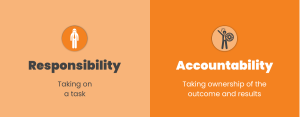Breaking the Accountability Dilemma: A Human-Centered Approach
By Howardco on Apr 9, 2025 in Executive Coaching, Leadership, Managing People, Team Development |
Accountability is an integral part of team performance., yet for many managers it presents a dilemma.
How can you and your fellow managers ensure accountability without undermining a culture of engagement and empathetic leadership?
Accountability managed well fosters personal growth, builds confidence and lifts individual and team results but handled poorly it can destroy team dynamics, undermine relationships and diminish trust and productivity.
Difference between Responsibility and Accountability

Effective accountability is not the old “command and control” model we’ve seen in the past; it needs to be:
- Human-centred
- Purpose-driven and
- Empowering rather than micromanaging.
How can you balance the need for accountability with the desire to create an empowering, engaging culture?
It’s about setting clear expectations on outcomes, engaging in regular and open feedback and providing a safe and supportive environment in which to work.
WHY ACCOUNTABILITY MATTERS
- 82% of people either avoid or fail at holding others accountable.
- High performers thrive in high-accountability environments; low performers dislike them.
- Accountability fosters respect and stronger relationships among team members (Patrick Lencioni).
For example, having an open discussion about the purpose of an activity, the relevance to the outcome and expected results can alleviate misunderstandings, foster greater engagement and flush out any support required to deliver true ownership.
Conversely, lack of ownership or buy-in leads to poor motivation, low productivity and wasted effort, as well as the inevitable friction within the team.
Patrick Lencioni, in his book The Five Dysfunctions of a Team, highlights accountability as a core element of high-performing teams. However, for many leaders, the very notion of holding people accountable can seem in conflict with a leadership style that emphasises empathy, engagement, and support.
As a manager, developing an understanding of how to effectively achieve accountability in your team is key. This capability will empower your team to collectively and individually achieve results driven by a culture of trust, collaboration and mutual expectations.
By developing these skills, managers can redefine accountability as a tool for growth and empowerment, and a positive force that drives engagement, trust, and performance.

THE PRACTICAL MANAGER: EMPOWERING YOU TO MANAGE WITH ACCOUNTABILITY
Creating a culture of accountability is crucial to building high-performing teams. However, knowing how to effectively implement accountability can be a challenge. That’s where The Practical Manager comes in.
This new program is designed to provide you with actionable tools and strategies to manage your team with confidence and clarity. One of the core modules, Building Team Culture and Accountability, dives deep into how you, as a manager, can create a culture of ownership and high performance. You’ll learn how to set clear expectations, provide constructive feedback, and foster a safe environment for your team to take responsibility for their results.
If you’re ready to take your management skills to the next level and build a team that thrives on accountability, The Practical Manager is the program for you.
To learn more, download our free PDF: 5 Practical Skills Every Manager Needs and register for The Practical Manager Program here to secure exclusive Early Bird pricing.
We look forward to helping you transform the way your team achieves results.
toto slot
slot gacor
slot gacor
sabung ayam
slot gacor
slot gacor
slot gacor
slot gacor
situs toto
situs toto
toto slot
toto slot
situs gacor
situs gacor
slot gacor
slot gacor
situs slot
situs slot
slot gacor
slot gacor
toto slot
toto slot
slot gacor
slot gacor
server thailand
server thailand
slot thailand
slot thailand
slot gacor
slot gacor
rtp slot gacor
situs slot
situs slot
slot gacor
slot gacor
slot online
slot online
situs slot
situs slot
situs slot gacor
toto slot
situs slot
slot gacor
slot gacor
toto slot
toto slot
slot gacor
slot gacor
slot gacor
slot gacor
situs toto
slot gacor
slot gacor
slot gacor
situs toto
situs slot
situs slot
slot online
slot online
journal.stikesaisyogya.ac.id
journal.stikesaisyogya.ac.id
bento4d
bento4d
toto slot
toto slot
rtp slot
slot gacor
slot gacor
bento4d
slot thailand
slot thailand
toto slot
toto slot
slot resmi
jacktoto
jacktoto
jacktoto
jacktoto
jacktoto
jacktoto
slot gacor
jacktoto
jacktoto
jacktoto
jacktoto
jacktoto
jacktoto
Jacktoto
situs slot
situs slot
jacktoto
jacktoto
jacktoto
jacktoto
rtp slot
jacktoto
jacktoto
jacktoto
bento4d
jacktoto
jacktoto
jacktoto
slot gacor
slot gacor
jacktoto
jacktoto
slot gacor
slot gacor
slot gacor
slot gacor
bento4d
situs togel
jacktoto
jacktoto
slot gacor
slot gacor
jacktoto
jacktoto
slot88
slot88
slot gacor
slot gacor
jacktoto
jacktoto
jacktoto
situs toto
link slot
jacktoto
slot gacor
slot gacor
slot gacor
slot gacor
slot gacor
slot gacor
slot resmi
toto togel
toto slot
jacktoto
jacktoto
slot gacor
jacktoto
jacktoto
jacktoto
jacktoto
jacktoto
jacktoto
jacktoto
jacktoto
jacktoto
jacktoto
jacktoto
jacktoto
jacktoto
jacktoto
slot gacor
slot gacor
jacktoto
jacktoto
jacktoto
jacktoto
jacktoto
jacktoto
jacktoto
jacktoto
jacktoto
situs toto
situs toto
link jacktoto
jacktoto
situs toto
slot gacor
slot gacor
toto slot
toto slot
situs toto
jacktoto
link slot
slot gacor
jacktoto
link slot
situs togel
toto slot
jacktoto
link slot
jacktoto
link jacktoto
slot resmi
link jacktoto
jacktoto
jacktoto
jacktoto
jacktoto
jacktoto
jacktoto
situs toto
jacktoto
bento4d
toto slot
jacktoto
jacktoto
situs togel
jacktoto
link slot
toto slot
jacktoto
link slot
togel resmi
jacktoto
jacktoto
toto macau
jacktoto
jacktoto
result toto macau
toto slot
jacktoto
jacktoto
jacktoto
link slot
toto slot
jacktoto
rtp slot
jacktoto
link slot
slot gacor
jacktoto
slot gacor
jacktoto
jacktoto
jacktoto
situs toto
slot gacor
jacktoto
jacktoto
jacktoto
situs toto
jacktoto
slot gacor
toto slot
jacktoto
jacktoto
situs toto
jacktoto
link slot
situs toto
slot gacor
slot gacor
slot gacor
slot gacor
jacktoto
jacktoto
jacktoto
link slot gacor
situs toto
jacktoto
jacktoto
jacktoto
link slot
toto slot
jacktoto
slot gacor
jacktoto
jacktoto
link slot gacor
link slot gacor
jacktoto
jacktoto
jacktoto
jacktoto
jacktoto
slot gacor
situs slot
jacktoto
jacktoto
jacktoto
situs slot online
slot gacor
situs toto
situs toto
situs toto
toto slot
jacktoto
jacktoto
slot thailand
situs toto
jacktoto
jacktoto
jacktoto
toto macau
jacktoto
link togel
jacktoto
jacktoto
link togel resmi
hk pools
hk pools
jacktoto
jacktoto
jacktoto
situs toto
jacktoto
jacktoto
jacktoto
jacktoto
jacktoto
jacktoto
jacktoto
jacktoto
jacktoto
jacktoto
jacktoto
jacktoto
link togel
jacktoto
jacktoto
toto slot
jacktoto
situs toto
slot gacor
jacktoto
link slot gacor
jacktoto
rtp slot
situs slot
jacktoto
link togel
jacktoto
jacktoto
situs toto
jacktoto
jacktoto
jacktoto
jacktoto
jacktoto
situs toto
jacktoto
jacktoto
situs slot
slot online
jacktoto
jacktoto
jacktoto
jacktoto
toto slot
jacktoto
jacktoto
situs toto
jacktoto
situs toto
jacktoto
rtp slot
jacktoto
jacktoto
jacktoto
jacktoto
jacktoto
jacktoto
jacktoto
situs toto
jacktoto
situs slot
jacktoto
jacktoto
slot maxwin
daftar jacktoto
jacktoto
jacktoto
link slot
jacktoto
slot
situs toto
situs toto
jacktoto
jacktoto
slot thailand
situs toto
jacktoto
jacktoto
jacktoto
jacktoto
jacktoto
jacktoto
jacktoto
jacktoto
jacktoto
jacktoto
jacktoto
jacktoto
jacktoto
jacktoto
situs toto
situs slot
jacktoto
link togel
jacktoto
jacktoto
situs toto
jacktoto
jacktoto
toto slot
jacktoto
jacktoto
jacktoto
jacktoto
jacktoto
jacktoto
jacktoto
toto togel
situs toto
situs toto
jacktoto
jacktoto
jacktoto
jacktoto
jacktoto
jacktoto
toto togel
toto macau
jacktoto
slot resmi
situs toto
situs toto
slot gacor
kampungbet
jacktoto
toto slot
toto slot
jacktoto
situs togel
jacktoto
toto slot
rtp slot
jacktoto
kampungbet
toto slot
jacktoto
jacktoto
jacktoto
jacktoto
jacktoto
jacktoto
jacktoto
jacktoto
jacktoto
jacktoto
jacktoto
jacktoto
jacktoto
toto togel
jacktoto
link jacktoto
situs toto
jacktoto
situs slot
situs toto
situs toto
jacktoto
toto slot
jacktoto
jacktoto
jacktoto
jacktoto
toto togel
jacktoto
jacktoto
toto slot
situs toto
situs toto
toto slot
jacktoto
jacktoto
jacktoto
toto togel
situs slot
jacktoto
situs togel
jacktoto
situs toto
situs toto
toto slot
situs toto
jacktoto
jacktoto
jacktoto
jacktoto
jacktoto
jacktoto
jacktoto




















